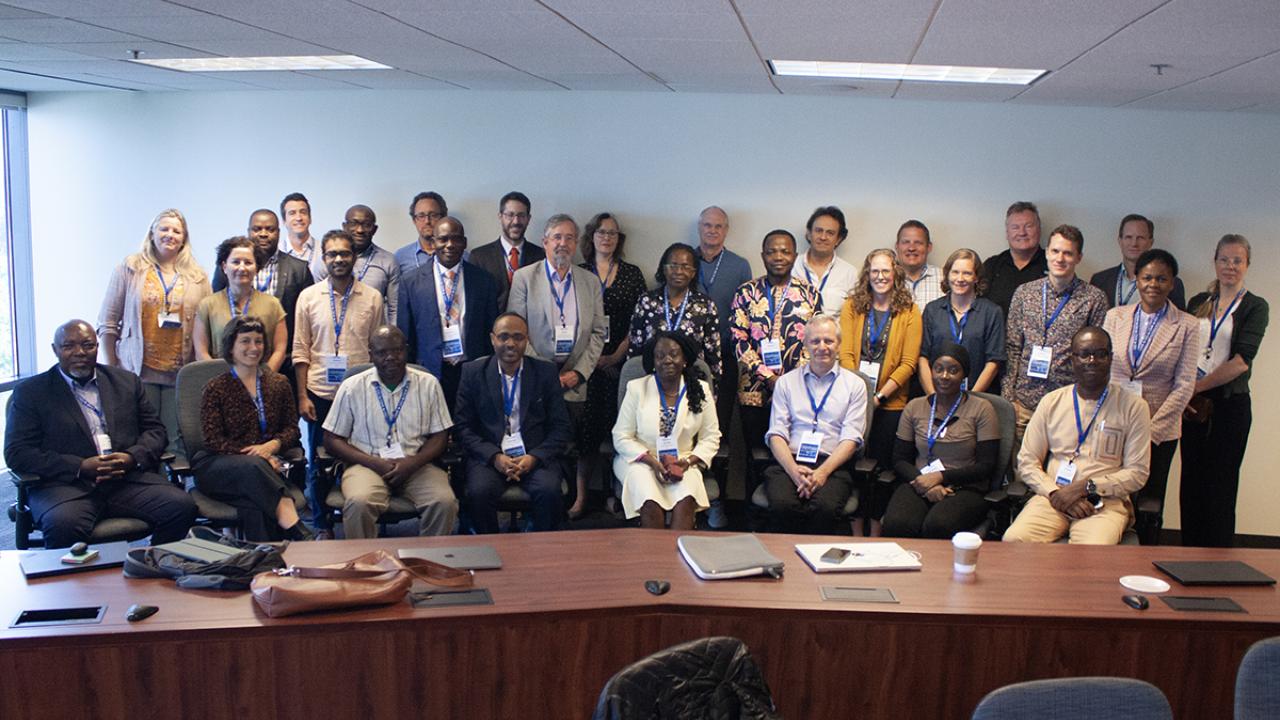
2023 MRR Innovation Lab Technical Meeting Shares Insights from Research Across the Globe
Researchers from across the globe converged in Atlanta, Georgia from May 24-25, 2023 to share their work in progress at this year’s MRR Innovation Lab Technical meeting.
This two-day meeting was attended by researchers representing 30 large-scale MRR Innovation Lab projects taking place across Africa and South Asia. The meeting was hosted at the University of Georgia by the Center for the Economic Analysis of Risk (CEAR).
“These meetings are an important opportunity for researchers to get feedback on their projects at any stage,” said Michael Carter, director of the MRR Innovation Lab. “The most important thing at a meeting like this is talking.”
The MRR technical meetings are similar to academic conferences in that researchers present their work or work-in-progress and receive questions and feedback from their peers. This process is central to how research is conducted because it pools expertise from multiple perspectives and backgrounds that improve the technical and practical aspects of a project.
“One of the unifying features of every presentation is their passion for the topic and their local knowledge. What is needed is a conversation with rigor so the lessons from the studies get through to a wider audience,” said Glenn Harrison, C.V. Starr Chair of Risk Management & Insurance at the University of Georgia and director of CEAR.
Harrison is an economist who is a leading expert on risk and index insurance. He is currently leading two MRR projects testing insurance, one focused on interventions that focus on people’s welfare and the other related to reducing conflict.
This year’s technical meeting included principal investigators funded through the lab’s Feed the Future ALL-IN initiative who traveled from Ethiopia, Ghana, Kenya, Malawi, Nigeria and Uganda. Roughly half of MRR Innovation Lab principal investigators are funded through Feed the Future ALL-IN, a which is a collaboration with Kenya-based International Centre for Evaluation and Development (ICED) to fund African researchers to lead large-scale research projects.
“A meeting like this, with other researchers from UC Davis and from other top institutions in the U.S., listening to them and them also listening to us and providing concrete feedback, is very important to improve the quality of our research. It also provides an avenue for future collaboration,” said Khadijat Amolegbe, a researcher and lecturer in agricultural Economics at the University of Ilorin.
Over two days, researchers presented research from many different countries that tests and evaluates a variety of approaches to strengthening livelihoods and resilience for rural families in low and middle-income countries. These included index insurance, small-scale irrigation, seed genotyping, digital marketplaces, stress-tolerant seed and insurance bundles, an improved measure of resilience and many others.
“In a compact, busy, tiring two days you actually get to hear an enormous array of experiences from different countries,” said Harrison.
Presentations:
Charles Amoatey (GIMPA): The Impact of Irrigation on Improved Productivity and Market Value for Smallholder Farmers in Northern Ghana
Khadijat Amolegbe (University of Ilorin): Digital Literacy, Output Market Access, and Demand for Rural e-commerce in Nigeria
Opeyemi Ayinde (University of Ilorin): Linking Financial and Agricultural for Women Farmers’ Resilience in Nigeria
Mark Buntaine (UC Santa Barbara): Empowering Local Decision Making to Improve Land Management in Malawi
Kevin Carney (University of Michigan): Better Borrowing to Promote Access to Water and Improve Dairy Farming in Kenya
Michael Carter (UC Davis) and Mo Alloush (Hamilton College): On the Definition and Estimation of Economic Resilience Using Well-identified Counterfactuals
Fred Dzanku (University of Ghana): Impact of credit and marketing contracts on women’s shea production and outcomes in Ghana
Kristina Hallez (UC Berkeley): How a Focused Budgeting Activity Increased Savings Across the Hungry Season in Zambia
Glenn Harrison (Georgia State University): Do No Harm – The Welfare Effects of Behavioral Index Insurance Interventions in Ethiopia
John Hoddinott (Cornell University): Do nutrition- and gender-sensitive agricultural programs improve resilience?
Mercy Kamau (Tegemeo Institute): Farmers’ Access and Willingness to Pay for Agro-Weather Advisories in High ‘Climate Risk’ Areas in Kenya
Salihu Kabir (Ahmadu Bello University Zaria): Adapting Climate Risk with Mutual Weather-Index Crop Insurance in Nigeria
Robertson Khataza (LUANAR): Digital Innovations to Improve Market Access to Horticultural Produce in Malawi
Berber Kramer (IFPRI): Crop Insurance Innovations to Build Trust in Financial Services for Agriculture in Ethiopia
John Kuwornu (University of Energy and Natural Resources): Pairing Small-scale Irrigation and Index Insurance to Manage Risk and Expand Access to Credit in Northern Ghana
Travis Lybbert (UC Davis): Assessing Seed System Resilience with Structured Genotyping in Uganda
Jeremy Magruder (UC Berkeley): Social Networks and Contracting Frictions in Factor Markets
Jonathan Malacarne (University of Maine): Subsidizing Learning about Resilience-building Agricultural Technologies in Mozambique
Florence Muhanguzi (Makerere University): Strengthening the Resilience and Empowerment of Women Smallholder Farmers in Uganda
Robert Osei (University of Ghana): Digital Communication to Reinforce Nutrition and Household Resilience in Northern Ghana
Ashish Shenoy (UC Davis): Promoting Resilient Agricultural Growth with Area Revenue Index Insurance in Ghana
Alan Spearot (UC Santa Cruz): The Value of Linking Farmers to Maize Value Chains in Rwanda
Solomon Walelign (University of Gondar): The Distributional Impacts of Large-Scale Land Transactions in Ethiopia
